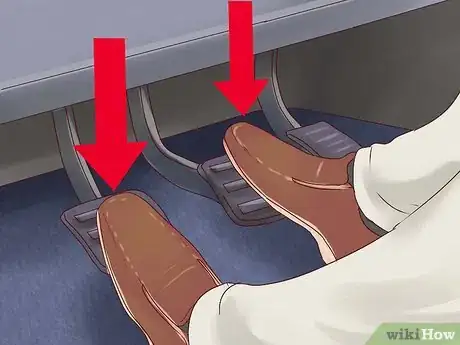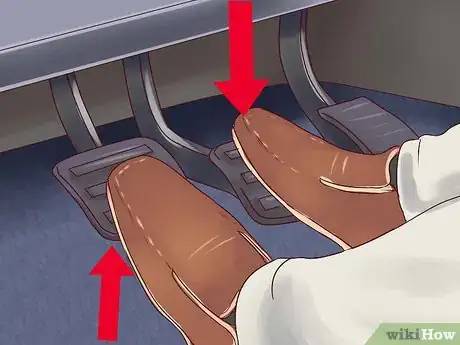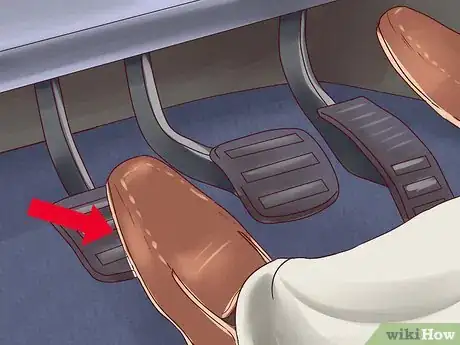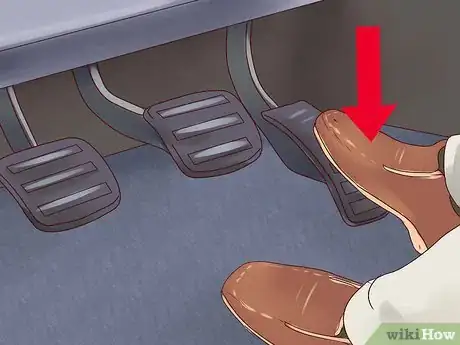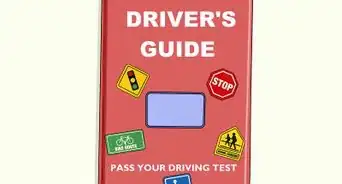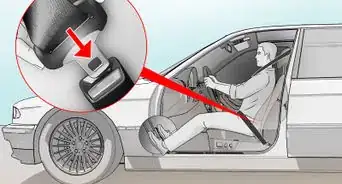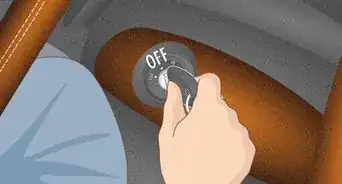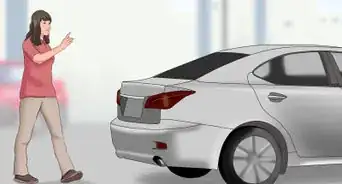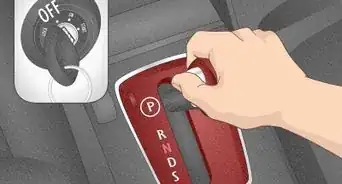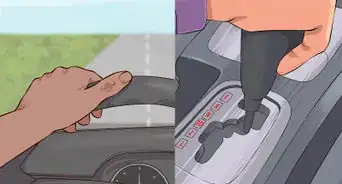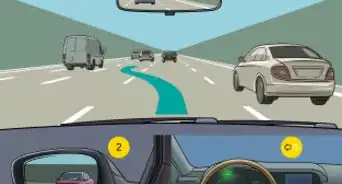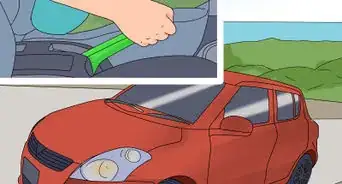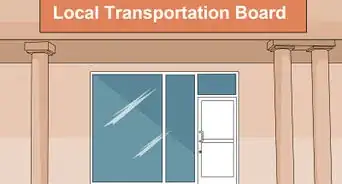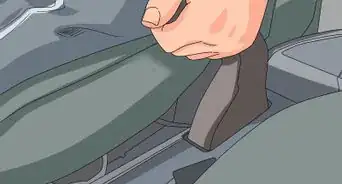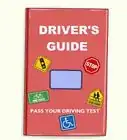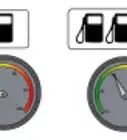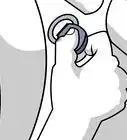This article was co-authored by Ibrahim Onerli. Ibrahim Onerli is a Driving Instructor and the Manager of Revolution Driving School in New York City. His mission is to make the world a better place by teaching safe driving. Ibrahim trains and manages a team of over eight driving instructors. He specializes in teaching defensive driving and stick shift driving.
wikiHow marks an article as reader-approved once it receives enough positive feedback. In this case, 86% of readers who voted found the article helpful, earning it our reader-approved status.
This article has been viewed 365,207 times.
This can be a valuable lesson for when you are first learning to drive a car with manual transmission (or "stick" shift). Hopefully, it will keep you from hitting the car behind you when you're starting on a steep hill. This can be applied to automatics as well.
Steps
With Emergency Brake
-
1Remember that once you have stopped completely, pull up the emergency brake.[1] Remove your foot off of the manual brake when you go to press the accelerator to keep your car from rolling backwards until you start moving.
-
2Press on the accelerator (and remove your other foot from the clutch) just as you would normally. The car will soon feel like it is wanting to move forward.[2]Advertisement
-
3Feel that the car is just about to move forward, keep accelerating slowly while at the same time removing the emergency brake.[3] By removing the brake at the right time, your car will already have the power it needs from the accelerator to move up the hill without the emergency brake needing to be on to keep it from rolling backwards.
Expert Method
-
1Press the clutch down just enough to allow the engine to return to normal idle speed.
-
2
Keep your right toes on the brake pedal, and turn your right foot inward so that your right heel is on the gas.[4] By tilting your right foot in this position, you are able to depress the accelerator with your right heel while keeping the brake pedal engaged with your toes. -
3Watch as the light changes, then press on the gas with your right heel and slowly let the clutch out.[5] Shortly after beginning this maneuver, remove your right toes from the brake pedal.
-
4The engine will rev, and the vehicle will begin to move forward. Once you have some forward momentum, move your right foot so that it is in a natural position on the gas pedal. You may need to press the clutch back in momentarily at this point. With some practice, you should be able to work all three pedals with just two feet, reduce engine revs to a minimum, and avoid jerking the clutch.
Expert for Steep Slope
Here is a no panic method, requiring lots of practice.
-
1Press both the clutch and the brake pedal.
-
2Do not release the brakes. Release the clutch slowly halfway until you feel vibrations (namely, until you feel like the car is trying to move forward). Observe the tachometer rev; it goes somewhere below 1000.
-
3Hold the clutch in the same position. Release the brake pedal (the car does not move anywhere).
-
4Press the accelerator pedal. Release the clutch gradually and you'll be off.
Expert Q&A
Did you know you can get expert answers for this article?
Unlock expert answers by supporting wikiHow
-
QuestionWhat gear should I use when driving uphill?
 Ibrahim OnerliIbrahim Onerli is a Driving Instructor and the Manager of Revolution Driving School in New York City. His mission is to make the world a better place by teaching safe driving. Ibrahim trains and manages a team of over eight driving instructors. He specializes in teaching defensive driving and stick shift driving.
Ibrahim OnerliIbrahim Onerli is a Driving Instructor and the Manager of Revolution Driving School in New York City. His mission is to make the world a better place by teaching safe driving. Ibrahim trains and manages a team of over eight driving instructors. He specializes in teaching defensive driving and stick shift driving.
Driving Instructor
-
QuestionHow can I prevent rolling back on a hill in an automatic car?
 Ibrahim OnerliIbrahim Onerli is a Driving Instructor and the Manager of Revolution Driving School in New York City. His mission is to make the world a better place by teaching safe driving. Ibrahim trains and manages a team of over eight driving instructors. He specializes in teaching defensive driving and stick shift driving.
Ibrahim OnerliIbrahim Onerli is a Driving Instructor and the Manager of Revolution Driving School in New York City. His mission is to make the world a better place by teaching safe driving. Ibrahim trains and manages a team of over eight driving instructors. He specializes in teaching defensive driving and stick shift driving.
Driving Instructor
-
QuestionCan I use method 3 with a petrol car?
 Community AnswerYes you can. Method 3 is the best and easiest, but needs practice to feel the car vibrations under high volume music. Your shoes also matter.
Community AnswerYes you can. Method 3 is the best and easiest, but needs practice to feel the car vibrations under high volume music. Your shoes also matter.
Warnings
- This can be really bad for your clutch and brake. Only do it if you really need to!⧼thumbs_response⧽
- Make sure that your emergency brake is in good condition. For example, on normal roads, can you drive your car forward with the emergency brake up? If so, it's time to get it tightened. This is important, obviously, so that the emergency brake can be sure to hold the car in place when you have removed your foot from the manual brake. Otherwise, your car may slip a little on a steep hill, even with the emergency brake up while you are accelerating.⧼thumbs_response⧽
References
- ↑ https://youtu.be/1xsO1jBlEOI?t=167
- ↑ https://www.driving-school-beckenham.co.uk/hillstarts.html
- ↑ https://youtu.be/1xsO1jBlEOI?t=317
- ↑ https://www.artofmanliness.com/articles/heel-toe-shift/
- ↑ https://www.artofmanliness.com/articles/heel-toe-shift/
- https://youtu.be/uljIvMuuMdQ?t=77
- https://www.drivingtests.co.nz/resources/hill-start-uphill-downhill/
About This Article
Starting a manual car on a hill can be a little tricky at first, but once you know how to work the clutch, accelerator, and brake, it should be a breeze. Start by turning on your car and putting your foot on the brake. Leave your emergency brake on for the moment. Then, slowly press on the accelerator while removing your other foot from the clutch to build up momentum. Keep accelerating slowly as you remove the emergency brake. Taking the brake off while accelerating will ensure you have enough power to move up the hill without rolling backward. To learn how to start your car quickly on a steeper slope, read on!
